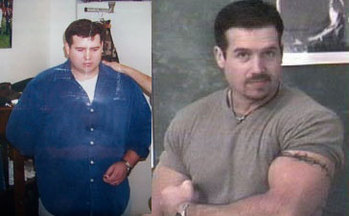[quote]Professor X wrote:
Chickenmcnug wrote:
IanJMcQ wrote:
Chickenmcnug, I am not really sure how you figured that out, but could you please show me. I am not trying to call you out, I just would like to know for my own knowledge. Thanks.
Takes a bit of work. On that link you will see his before and after stats listed:
Starting Date: May 15, 2007
Starting Weight: 220 lbs
Starting Body Fat: 21%
Finishing Date: Sept. 15, 2007
Current Weight: 165 lbs
Current Body Fat: 9%
220lbs - 165lbs = 55lbs total loss.
@ 220lbs and 21% bf he had 46.2lbs bf(220 x 0.21 = 46.2).
His LBM would be 220 - 46.2 = 173.8lbs
@ 165lbs and 9% bf he had 14.85lbs bf(165 x 0.09 = 14.85).
His LBM would be 165 - 14.85 = 150.15lbs
Gets a little tricky here.
Now during his weightloss he went from 21%bf to 9%bf. 46.2lbs - 14.85lbs = 31.35lbs of bodyfat were lost.
BUT you will see he lost 55lbs total. 55lbs - 31.35lbs = 23.65lbs that were something other than BF. Essentially LBM.
Now to get a percentage you just divide the lbs of bf lost by the total weight lost (i.e. 55lbs).
31.35lbs bf / 55lbs lost = 57% of weight lost is bodyfat
23.65lbs LBM / 55lbs lost = 43% of weight lost.
Well stated. Most bodybuilders would call that a complete FAILURE in fat loss if you lost nearly as much muscle as you did body fat. That is the same shit sedentary housewives do. The average person will lose half and half body fat and muscle if they just “diet” like a slim fast commercial.
The entire goal is to hold onto as much muscle as possible, something that becomes easier the more experience you actually have building it in the first place. Also, 150lbs of lean body mass at that height isn’t impressive to too many people.[/quote]
I was looking at it in terms of what I know. As far as bulking I know that atleast in the early years of one’s bodybuilding career you can easily gain 90% + LBM. I figured that cutting should be somewhat similar. Atleast 70% I guess would be a win.
Also, I would expect the higher your weight class and experience level the more it fluctuates. A 240lb bodybuilder probably bulks to 280 only to cut down to 255. In that case, i wouldn’t consider it a fail.
What % of BF(to LBM) should an average person typically expect to lose if doing it right?
